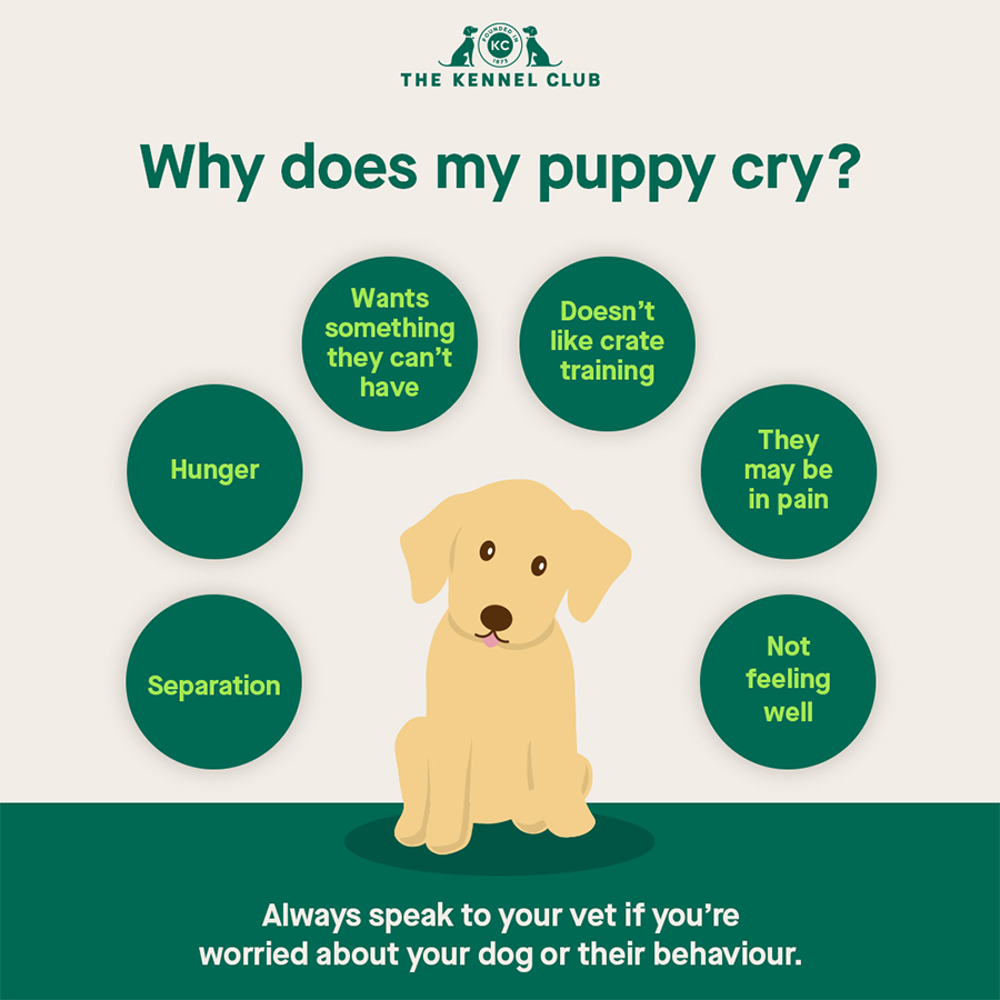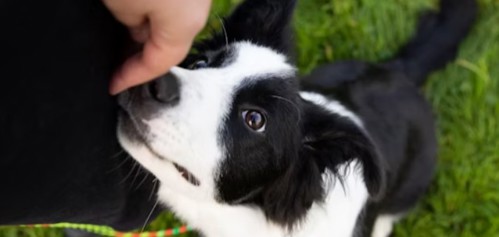
There are few noises as heart breaking as the sound of your new puppy crying. There are several different reasons why your new puppy is crying - sometimes life can be overwhelming for puppies when they are young and learning so many new things. Once you’ve worked out what’s making your puppy distressed, you’ll be better able to comfort them. Here are some of the key causes of your new puppy crying.
Your puppy is feeling lonely
New puppies cry when they first arrive at their new home. It takes time to adjust to being separated from their mother and littermates. This homesickness abates with time, once they form a bond with their new owners and adjust to new surroundings.
Your new puppy may cry when left alone too, even if you’re just in another room out of sight, like the bathroom. Over time your puppy will get used to their routine and this feeling should subside. You should teach your puppy to experience short periods of time on its own to get used to being on its own.
The best lifetime dog insurance
Protect your dog with the UK's Number 1 pet insurer, with up to £25,000 cover for vet fees.
Why is my new puppy crying at night?
It can take time for your new puppy to adjust to sleeping alone. For the first few nights, you may need to sleep nearby, perhaps with an arm or a hand in their bed. This will teach your puppy that they’re not alone and there’s nothing to worry about. Your puppy will love sleeping with cuddly toys.
Your puppy may be hungry
New puppies are full of beans and they burn off a lot of energy - but they also have small tummies. If they’re whining and sniffing around their food bowl, then it may be because they’re hungry.
Your puppy wants something they can’t have
Your puppy doesn’t like crate training
As part of toilet training your puppy, you may need to put them in a crate. Ultimately, dogs are social animals, and they want to feel included. Your new puppy may cry because they don’t like feeling separated from everyone else in the house. Get them used to a crate or puppy pen freely without the door being shut. Put things they like into this space such as toys or chews and start introducing this when your puppy is more likely to be settled after a walk, other activity or for its meal.
Instead of giving in and taking them out of the crate, you can distract your puppy by sitting next to the crate and playing with them. You can keep your puppy occupied by giving them food within a puzzle toy. Over time, move further and further away from the crate while they play with the toy, as they adjust to feeling more independent.
Your puppy is in pain
All sorts of things can cause your puppy to experience pain, such as vaccinations, insect stings or teething. Give your puppy a once over to make sure they’re ok, and contact your veterinarian if you’re concerned.
Your puppy is not feeling well
Should I be concerned about my puppy crying?
There’s no hard and fast rule here - it depends on the reason for the crying. Sometimes a puppy crying is totally normal and understandable, like when a new puppy is separated from its mother and is adjusting to new surroundings. This type of crying is likely to go away over time on its own with the correct management.
Sometimes your puppy is crying because they want attention and comfort. If your puppy is crying while their tail is wagging, they may just want to play with you. Again, this is normal, and your puppy should grow out of this.
If your puppy’s crying seems excessive or persistent, then it’s important to investigate the cause. This could be a sign that your puppy has an underlying health problem that needs to be addressed. If your puppy appears to be in pain, or they’re showing symptoms of being unwell, contact your veterinarian.
How do I soothe my new puppy and stop them from crying?
This depends on the reason for the puppy’s crying. If your puppy is not unwell or in pain, then they’re probably just looking for some love and reassurance. It’s a big adjustment to go from being part of a litter of pups to living in a new home with new humans. Here are some ways to help comfort them:
- Give your puppy a cuddle: Pick them up, put them in your lap and hold them close to you. Your body heat will feel reassuring for a new puppy. Stroking their fur will relax them. Puppies need to get used to being cuddled, so this needs to be introduced slowly, starting with relaxing strokes.
- Create some background noise: Being a new puppy means adjusting to all sorts of strange new sounds and noises. Putting on some soft, soothing background music may help to relax your puppy. You’ll find plenty of soothing music on YouTube and playlists specifically made for dogs.
- Shower your puppy with praise: While teaching your puppy new things, give them positive reinforcement and treats. Reward good behaviour with lots of attention and verbal praise, hands on, play with a toy, tummy tickle or with appropriate treats depending on their likes and dislikes. This will help them to feel good about themselves and their new surroundings.
- Create safe and comfortable space for your new puppy: Make sure there’s a private area set up for your puppy to retreat to when they’re feeling a bit overwhelmed like a crate, puppy pen or a safe space where their bed is placed. Cuddly toys, chew toys and or their dog bed will help them feel right at home.
Teaching your puppy not to cry
As they get used to their new environment and routine, puppies will outgrow this phase. However, there are some steps you can take to teach your puppy to be more independent and at ease.
- Stick to a routine: Dogs are creatures of habit, and so routines are comforting in times of anxiety. Try to be consistent with your new puppy with feeding, playtime and toilet breaks.
- Socialise your new puppy: Expose your puppy to all the things that you eventually want them to be comfortable with. This can include new people, other well behaved and sociable dogs, car rides and even the vacuum cleaner or household appliances starting at a distance. Socialising your puppy will boost their confidence and make life easier in the long run.
- Obedience training: Teaching your puppy the basics in obedience for example how to respond to their name and some basic commands such as how to come back when called, how to sit still and how to settle, will also boost their confidence and help reduce anxiety. Teaching your puppy to play with you will build your relationship, give you alternative rewards and help with exercises like calling your puppy back.
- Be patient while teaching your puppy: It can be frustrating when your puppy makes mistakes and isn’t learning quickly. But it is critical that you give your puppy the space to learn and grow at their own pace, in an environment where they feel safe.
Find a vet near you
If you're looking for a vet practice near you, why not visit the Royal College of Veterinary Surgeons' Find a vet page.
Find a dog trainer or behaviourist
Our online register helps you find accredited dog training instructors and canine behaviourists who have proven specialist knowledge, skills and experience.Think your dog may be affected?
If you're worried about your dog's health, always contact your vet immediately!
We are not a veterinary organisation and so we can't give veterinary advice, but if you're worried about any of the issues raised in this article, please contact your local vet practice for further information

